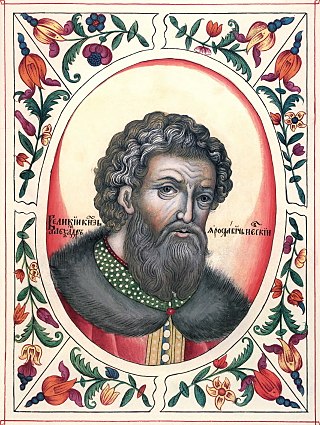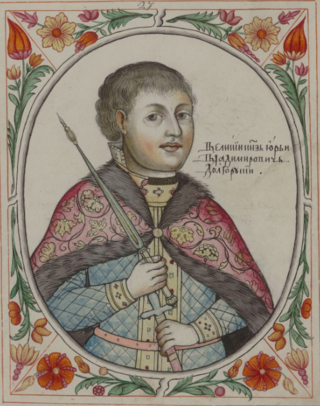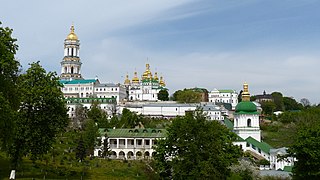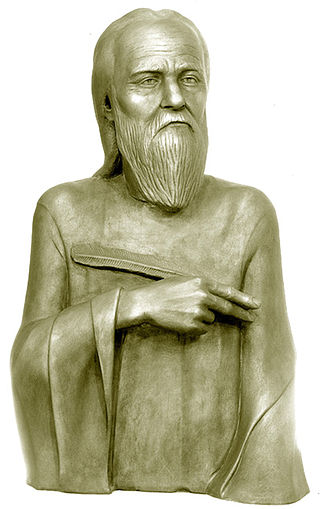
Abraham the Laborious (fl. 14th century) was a monk of Kiev.
He is regarded as a saint, with a feast day of 21 August at Kiev.

Abraham the Laborious (fl. 14th century) was a monk of Kiev.
He is regarded as a saint, with a feast day of 21 August at Kiev.
Olga was a regent of Kievan Rus' for her son Sviatoslav from 945 until 960. Following her baptism, Olga took the name Elenа. She is known for her subjugation of the Drevlians, a tribe that had killed her husband Igor of Kiev. Even though it was her grandson Vladimir who converted the entire nation to Christianity, because of her efforts to spread Christianity through Rus', Olga is venerated as a saint in the Eastern Orthodox Church with the epithet "Equal to the Apostles". Her feast day is 11 July.

Vladimir I Sviatoslavich or Volodymyr I Sviatoslavych, nicknamed the Great, was Prince of Novgorod, Grand Prince of Kiev, and ruler of Kievan Rus' from 980 to 1015. Several scholars refer to him as Volodimer I or Volodimir I, and his descendants as Volodimerovichi, while the Eastern Orthodox Church canonised him as Saint Vladimir/Saint Volodymyr.

Yaroslav I Vladimirovich, better known as Yaroslav the Wise, was the Grand Prince of Kiev from 1019 until his death. He was also earlier the Prince of Novgorod and Prince of Rostov, uniting the principalities for a time. Yaroslav's baptismal name was George after Saint George.

Anne of Kiev or Anna Yaroslavna was a Rus' princess who became Queen of France in 1051 upon marrying King Henry I. She ruled the kingdom as regent during the minority of their son Philip I from Henry's death in 1060 until her controversial marriage to Count Ralph IV of Valois. Anne founded the Abbey of St. Vincent at Senlis.

Alexander Yaroslavich Nevsky served as Prince of Novgorod, Grand Prince of Kiev (1246–63) and Grand Prince of Vladimir (1252–63) during the Mongol conquest.

Yuri I Vladimirovich, commonly known as Yuri Dolgorukiy or the Long Arm was a Rurikid prince. Noted for successfully curbing the privileges of the landowning boyar class in Rostov-Suzdal and his ambitious building programme, Yuri transformed this principality into the independent power that would evolve into early modern Muscovy. Yuri Dolgorukiy was the founder of the Yurievichi dynasty, a branch of the Monomakhovichi.

Kyiv, also spelled Kiev, is the capital and most populous city of Ukraine. It is in north-central Ukraine along the Dnieper River. As of 1 January 2022, its population was 2,952,301, making Kyiv the seventh-most populous city in Europe. Kyiv is an important industrial, scientific, educational, and cultural center in Eastern Europe. It is home to many high-tech industries, higher education institutions, and historical landmarks. The city has an extensive system of public transport and infrastructure, including the Kyiv Metro.

Nestor the Chronicler was a monk who is the reputed author of Primary Chronicle, Life of the Venerable Theodosius of the Kiev Caves and Account about the Life and Martyrdom of the Blessed Passion Bearers Boris and Gleb.
Sviatoslav II Iaroslavich or Sviatoslav II Yaroslavich was Grand Prince of Kiev between 1073 and 1076. He was born as a younger son of Grand Prince Yaroslav the Wise, and became the progenitor of the Sviatoslavichi (Svyatoslavychi). His baptismal name was Nicholas.

Andrew I, his Russian name in full, Andrey Yuryevich Bogolyubsky, was Grand prince of Vladimir-Suzdal from 1157 until his death. Andrey accompanied Yuri I Vladimirovich, his father, on a conquest of Kiev, then led the devastation of the same city in 1169, and oversaw the elevation of Vladimir as the new capital of northeastern Rus'. He was canonized as a saint in the Russian Orthodox Church in 1702.

Anthony of Kiev also called Anthony of the Caves was a monk and the founder of the monastic tradition in Kievan Rus'. Together with Theodosius of Kiev, he co-founded the Kiev Pechersk Lavra.

A synaxis is a liturgical assembly in Eastern Christianity, generally for the celebration of Vespers, Matins, Little Hours and the Divine Liturgy.

Vasylkiv is a city on the Stuhna River in Obukhiv Raion, Kyiv Oblast, central Ukraine. It hosts the administration of Vasylkiv urban hromada, one of the hromadas of Ukraine. First mentioned in the 10th century, Vasylkiv was incorporated as a city in 1796.

Zoloti Vorota is a station on the Kyiv Metro system that serves Kyiv, the capital city of Ukraine. The station was opened as part of the first segment of the Syretsko-Pecherska Line on 31 December 1989. It serves as a transfer station to the Teatralna station of the Sviatoshynsko-Brovarska Line. It is located near the city's Golden Gate, from which the station takes its name.

The Order of Saint Basil the Great, also known as the Basilian Order of Saint Josaphat, is a Greek Catholic monastic order of pontifical right that works actively among Ukrainian Catholics and other Greek-Catholic churches in central and Eastern Europe. The order received approbation on August 20, 1631, and is based at the Monastery of the Holy Trinity, Vilnius.

Kievan Rus', also known as Kyivan Rus', was a state and later an amalgam of principalities in Eastern and Northern Europe from the late 9th to the mid-13th century. Encompassing a variety of polities and peoples, including East Slavic, Norse, and Finnic, it was ruled by the Rurik dynasty, founded by the Varangian prince Rurik. The modern nations of Belarus, Russia, and Ukraine all claim Kievan Rus' as their cultural ancestor, with Belarus and Russia deriving their names from it. At its greatest extent in the mid-11th century, Kievan Rus' stretched from the White Sea in the north to the Black Sea in the south and from the headwaters of the Vistula in the west to the Taman Peninsula in the east, uniting the East Slavic tribes.

Princess Christina Ingesdotter of Sweden was a Swedish princess and a princess consort of Veliky Novgorod, Rostov and Belgorod, by marriage to Grand Prince Mstislav I of Kiev.
Ingegerd Olofsdotter of Sweden, also known as Irene, Anna and Saint Anna , was a Swedish princess and a Grand Princess of Kiev. She was the daughter of Swedish King Olof Skötkonung and Estrid of the Obotrites and the consort of Yaroslav I the Wise of Kiev. She is venerated as a saint in the Eastern Orthodox Church. Ingegerd or Saint Anna is often confused with the mother of Saint Vladimir “the Enlightener” of the Rus. This is mainly because Ingegerd and Yaroslav also had a son named Vladimir. However, Saint Vladimir was the father of Ingegerd’s husband Yaroslav I “the Wise”, thus making her Saint Vladimir’s daughter-in-law. Saint Vladimir was the son of Sviatoslav and Malusha.
The Archeparchy of Polotsk(-Vitebsk) was a suffragan eparchy of the Metropolis of Kiev, Galicia and all Ruthenia in the Ruthenian Uniate Church from 1596 to 1839. It was situated in the Polish–Lithuanian Commonwealth. The cathedral of the archeparchy was Saint Sophia Cathedral in the city of Polotsk.